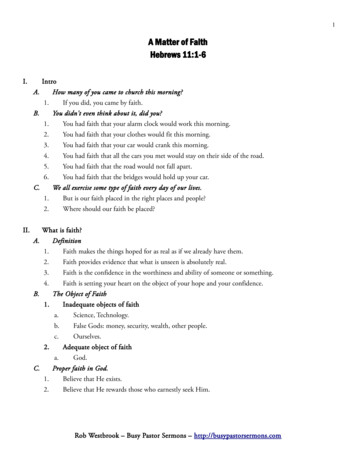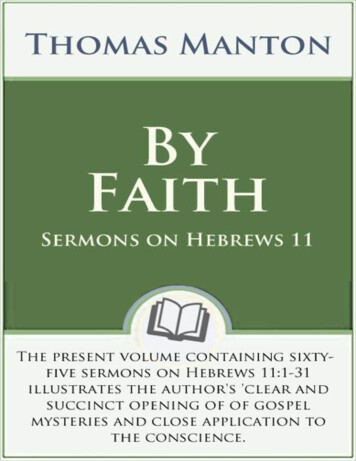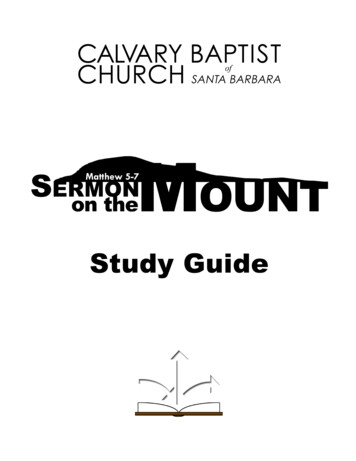
Transcription
Sermon on the MountPart 1: Matthew 5Written by Cheryl Mullis and Laura Dingess with editing support from NancySherwood, Brianne Aiken, and Harrison Spitler, and graphic design by David Harris.LessonScripturePageIntroductionLesson 1Matthew 5:1-112-10Lesson 2Matthew 5:1-1111-20Lesson 3Matthew 5:1-1121-27Lesson 4Matthew 5:13-1628-34Lesson 5Matthew 5:17-2035-44Lesson 6Matthew 5:21-2645-52Lesson 7Matthew 5:27-3253-61Lesson 8Matthew 5:33-3762-70Lesson 9Matthew 5:38-4271-77Lesson 10Matthew 5:43-4878-84AppendixMatthew 5-7 Text85-931
Sermon on the MountMatthew 5:1-11Lesson 1: Beatitudes Part 1Living Under the WordSermon Notes2
Personal Bible StudyThe Sermon on the Mount found in Matthew 5-7 is Jesus’s longest recorded sermon.Many familiar words, phrases and concepts are found in these three familiar chaptersof scripture. The message of this sermon is very clear. Jesus describes the lifestyle ofthose who belong to his kingdom. He challenges value systems, ethics, religiousdevotion, attitudes about relationships and money. Would it surprise you that theresponse of his disciples might be this: “There is no way I can live like this. Is it evenpossible?!”Like Jesus’s disciples on that mountain in the first century, his disciples today need towrestle with his words. What kind of life is Jesus calling us to? What does he want usto understand about who he is and the authority he has? If we are going to followJesus as his disciples, we must be willing to trust him and believe what he says. Let uslook with new eyes and a fresh perspective on this famous sermon, becoming men andwomen who wholeheartedly follow Jesus.1. Read Matthew 5:1-7:29 found on page 86 of this study guide. Highlight therepeated words and phrases. Look for themes, patterns, comparisons, andcontrasts. Use this chart to record what you find.Sermon on the Mount Observations: Matthew 5:1-7:293
Sermon on the Mount Observations (continued)4
2. Read Matthew 4:12-17 and compare it to Isaiah 9:1-2. Where was Jesus? Whowas his audience? What did he say? Why were these words meaningful?3. The chapters and verses in our modern bible are meant to help us easily locatescripture references. When Matthew wrote this gospel, however, he recorded itas one continuous story. To place the Sermon on the Mount in context, readMatthew 4:17-5:1 as one story. Who was with Jesus as Matthew 4 drew to a closeand Matthew 5 began?4. Theologians call Jesus the new and better Moses. There are many parallelsbetween Moses and Jesus. Viewing Jesus as the new and better Moses will addmeaning to the seemingly ordinary events that occur in Matthew 4-5. Read thefollowing verses and compare Jesus and Moses.MosesJesusExodus 1:15-22:Pharaoh killed babiesMatthew 2:16-17Exodus 3God told Moses to lead his peopleout of EgyptMatthew 2:13-15Exodus 14:21-22Pass through the Red SeaMatthew 3:13-17Joshua 5:640 years in the wildernessMatthew 4:1-2Exodus 19-20Went up onto Mount Sinai to receivethe law from GodMatthew 5:15
When Jesus is transfigured (Matthew 17) before the three disciples, he completed thestory of Moses. He became the new mediator who goes up on the new mountain andreflects God’s presence. This fulfills the hope of the people living under the rule ofYahweh and becoming like him. Jesus moves the story forward, because unlike Moses,Jesus’s face now always shines and he doesn’t have to cover his face. Jesus reveals thewill of God in his shining face.“Matthew’s Gospel as You’ve Never Read It Before” (TGC article by Patrick Schreiner;September 6. 2019.)5. How does knowing that Jesus is the new mediator change the way you hear hisword?6. Jesus preaches this sermon with authority, setting clear and right expectationsfor his followers, those who are citizens of the kingdom of heaven. Read thefollowing verses and identify what these expectations are.Matthew 4:12-17Matthew 4:19Matthew 5:2-12Matthew 7:24-29Matthew 28:18-206
7. Reflect on all the verses you read in this lesson. What has made the mostimpact on your life? What does Jesus want YOU to know? What was mostconvicting to you?7
Living Out Our Faith TogetherGroup Discussion Questions1. Reflect on the sermon. What resonated with you? What questions or insights doyou have?2. Read Matthew 5-7 as a group.3. Where does the Sermon on the Mount occur in God's story, the metanarrative?Why does this context matter?Note: The biblical metanarrative is the overarching story of scripture that isdivided into four parts: Creation, Fall (or Rebellion), Redemption, andRestoration. When you read scripture, it is helpful to think about where eachpassage fits in the story.4. What intrigued you about the Sermon on the Mount? Share something newthat you learned or share a question you have about what you read.5. In what ways did the comparison between Moses and Jesus add to yourunderstanding?8
6. Jesus perfectly displayed and lived out the life he described in the Sermon onthe Mount. How did the world respond to Jesus? How will the world respond toHis disciples, or followers?7. What kind of life is Jesus describing for his disciples? If you are a follower ofJesus, what is your response to his description? If you are not a follower ofJesus, what is your response?9
PrayerThe Beatitudes is such a succinct list of ways to live a life that reflects the promise ofHeaven. Take time to pray through this passage (Matthew 5:3-12). We recommendhaving one reader who reads the passage aloud, but pauses after each verse andallows time for others to pray out loud as a group in between the verses.10
Sermon on the MountMatthew 5:1-11Lesson 2: Beatitudes Part 2Living Under the WordSermon Notes11
Personal Bible StudyThis account of the Sermon on the Mount was written by Matthew to apredominantly Jewish audience who knew of the faithfulness of God and werewaiting for the promised Messiah.The message of a Messiah King was proclaimed by the Old Testamentprophets. The prophet Jeremiah said,“Behold, the days are coming” declares the Lord, “when I will raise upfor David a righteous Branch, and he shall reign as king and dealwisely, and shall execute justice and righteousness in the land. In hisdays Judah will be saved, and Israel will dwell securely. And this is thename by which he will be called: ‘The Lord is our righteousness.’Jeremiah 23:5-6When Jesus began calling his disciples, Philip―one of the disciples―recognizedwho Jesus was and said to Nathanael,“We have found him of whom Moses in the Law and also the prophets wrote,Jesus of Nazareth, the son of Joseph.” John 1:45In the first two chapters of Matthew’s gospel, he reinforces the evidence ofGod’s faithfulness by repeating this theme five times“All this took place to fulfill what the Lord had spoken by the prophet” Matthew1;22, 2:5, 2:15, 2:17. 2:23Jesus’s identity was a big deal. His presence among his people was about tochange everything. And the reality of his with-us presence means that hiskingdom is not somewhere far off or distant, rather the kingdom is here. Andthat reality matters. It impacts every aspect of our lives, calling us to live ascitizens of the kingdom.1. Read Matthew 5:1-7:292. Read Matthew 1:1-17. What did Matthew want his readers to know about Jesus?Why did Matthew emphasize that Jesus Christ was the son of David?12
3. List the significant events that Matthew records in Matthew 1:18-4 on the chartbelow. Comment on your observations. (Who does Matthew name? Where werethey? What did they do or say? In what ways does this narrative set the stagefor the Sermon on the Mount?)Matthew 1:18- 2Matthew 3Matthew 413
One theme that you may have seen in these chapters is that of king and kingdom.Jesus, the son of King David, is the promised Messiah or king. John the Baptistpreaches, “Repent, for the kingdom of heaven is at hand”.The kingdom theme bookends the Sermon on the Mount, see Matthew 5:3 andMatthew 7:21. (Matthew 4:17 also refers to the kingdom.) In his sermon, Jesus describeskingdom life and paints a picture of what it looks like to live as people who belong tothe kingdom.From that time Jesus began to preach, saying, “Repent, for the kingdom ofheaven is at hand.”Matthew 4:17Blessed are the poor in spirit, for theirs is the kingdom of heaven.Matthew 5:3And when Jesus finished these sayings, the crowds were astonished at histeaching, for he was teaching them as one who had authority, and not as theirscribes.Matthew 7:28-29.4. According to Jesus, when and where is the kingdom of heaven?5. What did the disciples know about the Messiah? What type of king did theyseek and was Jesus the type of king they were looking for? Why or why not?6. Jesus begins describing life in the kingdom with a list of beatitudes. What is abeatitude?(To look up the Greek word for beatitude (makarios), type “Strong’s Greek#3107” in your browser.)14
The beatitudes follow a pattern: a promise, followed by an exhortation that describeswhat it looks like to live as citizens of his kingdom. Jesus is calling together a peoplewho will live under his reign in a counter-cultural way. He wants his disciples to laydown their kingdoms and follow him.7. Read Matthew 5:3-4. List what or who comes to your mind when you think ofpoverty and mourning?8. What do the following verses teach about being poor? Why would the promiseof the kingdom of heaven be a blessing to those who are poor in spirit?a. Psalm 34:6b. Psalm 40:16-17c. Psalm 69:32-33d. Psalms 72:12-139. Make a list of areas in your life that you are poor in spirit. (Someone who ispoor in spirit is someone who has insufficient resources to help him or herself)15
10. Jesus says his disciples are blessed when they mourn because of their sin. Whywould sin cause us to mourn?e. Read Isaiah 6:1-6 and describe Isaiah’s response to his encounter withGod.f. How does Nehemiah respond when he learns about Israel’s generationalsin in Nehemiah 1:1-6?g. What does James say about mourning in James 4:6-9?11. How does God comfort those who mourn over sin? Read 2 Corinthians 7:6-10and James 4:8-10.12. Ask the Spirit to reveal an area of sin in your life. Ask Him to give you a heartthat is filled with Godly grief, leading you to repentance and forgiveness.16
13. Write Matthew 5:5 here. Who is blessed?14. How does the world define meekness?Look up the Greek definition of meek. (Strong's #4239).How are these two definitions different?15. Based on the biblical definition of meek, how meek are you?16. Rewrite the first three beatitudes in your own words.17
Living Out Our Faith TogetherGroup Discussion Questions1. Reflect on the sermon. What resonated with you? What questions or insights doyou have?2. Read Matthew 4:17-5:11.3. How does seeing Jesus as king shape the way you read and understand theSermon on the Mount?4. How does viewing yourself as a citizen of the kingdom of heaven shape yourunderstanding of Jesus’s sermon?5. How does Jesus describe the life of a disciple in Matthew 5:1-11?6. Think about how Jesus has described people who are blessed. What lies is theworld telling you that are counter to what Jesus said?18
7. Why would the promise of the kingdom of heaven be a blessing to those whoare poor in spirit?8. The mourning that Jesus describes in Matthew 5:4 could be called godly grief.The Heidelberg Catechism (Answer 89) defines godly grief this way: is to begenuinely sorry for sin, to hate it more and more, and to run away from it.Are you willing to name your sin? Do you experience deep grief over your sinand desire to run away from it?In what ways are you tempted to hide your sin, to bury or ignore it?How does this understanding of godly grief impact the way you view the sin inyour life? What does godly grief produce in us? see 2 Corinthians 7:10-13.9. How can our group help each other as we strive to live the life Jesus has calledus to live?19
PrayerOne useful tool to help shape our prayers is the ACTS model, stated below. Take timeindividually to identify at least one prayer you have for each category and then praythose ACTs prayers together.A - AdorationC - ConfessionT - ThanksgivingS - SupplicationA-C-T-S-20
Sermon on the MountMatthew 5:1-11Lesson 3: Beatitudes Part 3Living Under the WordSermon Notes21
Personal Bible StudyViewing the sermon from 50.000 feet provides the context needed to understand thelifestyle Jesus is describing. The temptation is to take each familiar chunk of Jesus’steaching and view it as a standalone message, which might lead us to think of theseteachings as a moralistic code or something we can accomplish by being disciplinedenough.In Matthew 4:17, Jesus tells his followers to repent, for the kingdom of heaven is here.He then describes the lifestyle of those who belong to the kingdom. Only in Christ arewe able to attain the level of righteousness that Christ describes. He wants his disciplesto know that he is here. That is why he came. To live as he lived and die as he died.When we trust our lives to Christ he regenerates us from the inside out. He gives us anew heart. The prophet Jeremiah alludes to this in Jeremiah 31. He says,“Behold, the days are coming,” declares the Lord, “when I will make a newcovenant with the house of Israel and the house of Judah, not like thecovenant that I made with their fathers on the day when I took them by thehand to bring them out of the land of Egypt, my covenant that they broke,though I was their husband,” declares the Lord. “For this is the covenant thatI will make with the house of Israel after those days,” declares the Lord: “I willput my law within them, and I will write it on their hearts. And I will be theirGod, and they shall be my people. And no longer shall each one teach hisneighbor and each his brother, saying, ‘Know the Lord,’ for they shall all knowme, from the least of them to the greatest,” declares the Lord. “For I willforgive their iniquity, and I will remember their sin no more.”Keep this context in mind as you dive into the sermon.1. Read Matthew 5:1-7:29 and focus on Matthew 5:3-11.2. Define righteousness. (Strong’s #1343).3. Who is our righteousness? Read I Corinthians 1:26-31.4. What does Jesus promise to those who hunger and thirst after righteousness?22
5. How can you tell if you are satisfied in Christ? Or are you hungering andthirsting for things that will never satisfy?6. What is mercy? (Strongs #1655) How are being merciful and receiving mercyrelated?7. What are indicators of someone who is pure in heart?8. Who does Jesus say is blessed in verses 9-11?9. How can you be a peacemaker with the people in your life? What are somepractical ways you can do this?23
10. What is the context of the persecution that Jesus describes in verse 10? Sharesome examples of what this type of persecution looks like.11. Rewrite the beatitudes in your own words.12. What is the overarching theme of the beatitudes?24
Living Out Our Faith TogetherGroup Discussion Questions1. Reflect on the sermon. What resonated with you? What questions or insights doyou have?2. How does the world’s view of blessed, or blessing, differ from what Jesustaught? What do you count as blessings?3. What challenges you as you consider Jesus’s description of life as a citizen ofthe kingdom of God?4. Were there any warnings that captured your attention?5. How can you be a peacemaker with the people in your life? What are somepractical ways you can do this?25
6. What is the context of the persecution that Jesus describes in verse 10? Sharesome examples of what this type of persecution looks like.Perhaps reading the beatitudes has left you with a growing awareness of yourown inadequacy and inability. Do not lose hope. Jesus is purposely exposing thedeep core issues about the state of our hearts and calling us to a deeperobedience. Jesus moves toward his people as their righteous king and shows ushow to live.26
PrayerMatthew 5:10 says, "Blessed are those who are persecuted for righteousness' sake, fortheirs is the kingdom of heaven." Share with one another about a place in your liveswhere you felt persecuted, reviled, or underappreciated, and pray for each other. Werecommend going around the room in a circle sharing, then praying for the person onyour right.27
Sermon on the MountMatthew 5:13-16Lesson 4: Gospel Salt and Gospel LightLiving Under the WordSermon Notes28
Personal Bible StudyAt the end of the Beatitudes, in verses 10 and 11, it becomes clear that followers ofChrist will face persecution because of their belief. The Beatitudes raise questions like:How are we to fulfill what Jesus calls the believers to be? How are we to respond topersecution? How do we live as members of God’s kingdom when we are on earth?Jesus begins to explain using real life examples that everyone is familiar with: salt andlight.1. Read Matthew 5:1-7:292. Read Matthew 5:13-16.3. What are the uses for salt? What was salt used for during the time Jesus wason earth?4. What are some characteristics of salt (taste, cost, texture, etc.)?5. Look at these passages to discover other uses of salt in the Bible:a. Ezekiel 16:4b. 2 Kings 2:21c. Judges 9:45d. Leviticus 2:1329
6. Why are believers called the “salt of the earth”? What do you think Jesus issaying here? Compare the uses and characteristics of salt to followers of Christ.7. How can salt lose its taste? How can followers of Jesus lose their saltiness?8. What does verse 13 say should be done with salt that has lost its taste?a. Read Mark 9:42-50 to further understand what it means for a believer tolose their saltiness.b. Why is this very serious?9. In Colossians 4:6, what area of our life is specifically called to be seasoned withsalt? Why is this important?30
10. Read these passages where light is mentioned. Note what the light representsand what is commanded:a. John 8:12b. 1 John 1:5-10c. Colossians 1:13-14d. Isaiah 9:1-2e. Ephesians 5:8-1411. Where do we get our light? How do we become a “light of this world”?12. Having this light, what are we called to do (v.16)? What does this mean?13. Having this light, what are we not supposed to do (v.14-15)? What does thismean?31
Living Out Our Faith TogetherGroup Discussion Questions1. Reflect on the sermon. What resonated with you? What questions or insights doyou have?2. How are believers to be “salt of the earth”? What are some practical ways todo this?3. What areas of society are “dark”? How can you be a light, specifically in theseareas?4. Do you ever find yourself hiding your light? What is causing or tempting you tohide your belief in the Lord?5. Darkness affects your ability to see clearly. How does your sin and darknessaffect your relationship with God? How does the brokenness of the world affectyou having a kingdom mindset?32
6. Have you seen your saltiness and light affect those around you?7. How have you seen other believers' salt and light affect your life and lives ofothers? How can you help other believers in this?8. In what areas of your life can you be salt and light to nonbelievers? How canyou share the light with them?33
PrayerRead verse Matthew 5:16 again. In order to shine a light for each other, share as agroup where you have seen God's faithfulness recently. Take time together to praisehim for these things and how we can rely on his faithfulness and steadfast love.34
Sermon on the MountMatthew 5:17-20Lesson 5: Christ the Fulfilled LawLiving Under the WordSermon Notes35
Personal Bible Study1. Read Matthew 5:1-7:29.2. Read Matthew 5:17-20.When Jesus talks about the “Law and the Prophets” he is referring to the wholeof the Hebrew Bible including the Pentateuch (Genesis, Exodus, Leviticus,Numbers, and Deuteronomy) and the Prophets (the prophetic and poetrybooks). This is the whole story of God’s grace and the Mosaic Covenant thatGod made with Israel. The Law and the Prophets included much more thanwhat commandments or rules God’s people must obey; it also encompassesJesus’s relationship to the covenant that God made with Israel.3. What do the following verses teach about the law and prophets?a. Mark 7:1-13b. Luke 24:13-23c. Acts 10:34-43d. Romans 13: 8-1036
4. The word abolish (Strong’s Greek #2647, katalyo) means to destroy, throwdown, demolish, overthrow, dissolve, or loosen. Jesus says that he has not cometo katalyo (abolish) the Hebrew scriptures, rather he will fulfill them.What does Jesus say in verse 17? Why does Jesus make this statement? Thinkof some reasons why his listeners might think that he had come to abolish thelaw and prophets?5. Look up fulfill in the Greek. (Strong’s Greek #4137). Write the definition here.In his gospel Matthew refers to the fulfillment of scripture 15 times. He clearlywants his readers to know that Jesus is the promised Messiah, the one aboutwhom the prophets had spoken.Take some time to read through some of these verses in Matthew’s gospel andnote what they say about fulfillment.Matthew 1:22-23Matthew 2:15Matthew 2:17-18Matthew 2:23Matthew 4:14-16Matthew 5:17Matthew 8:17Matthew 12:17-21Matthew 13:14-15Matthew 13:35Matthew 21:4-5Matthew 27:9-1037
What does this definition and these verses add to your understanding of whoJesus is and what he came to do?6. List some of the ways that Jesus has fulfilled scriptures. Include scripturereferences.PromiseFulfillment38
When Jesus says “For truly, I say to you” in verse 18, he is making a distinctionbetween himself and the Old Testament prophets. The Greek word, amen,which is translated “truly” or “I tell you the truth” signified that important andauthoritative words would follow. Jesus is in essence saying to his listeners:Listen to me. Pay attention. I need to tell you something extremely important!He speaks with personal authority and that sets him apart from the otherteachers.7. When Jesus speaks with authority in Matthew 5:18-19, what is Jesus saying aboutscripture?8. How did the apostle Paul affirm the authority of scripture in 2 Timothy 3:15-17?9. An” iota” or a “dot” refers to the Hebrew letter yod, the smallest letter in theHebrew alphabet. Think of it like a comma or a small stroke in the Englishlanguage. How does Jesus regard even the smallest letters in scripture?10. Describe the consequences someone who relaxes one of scripture’s smallestcommands will face.39
11. What do these verses teach us about following God’s commands and teachingothers to do the same?a. John 14:15b. John 15:10c. I John 2:3d. I John 3:24e. I John 5:312. Look up the word righteousness. (Strong’s Greek 1343) What is righteousness?13. What type of righteousness must one possess to enter the kingdom of God?Note: Who were the Scribes and Pharisees?Scribes were experts in the interpretation and application of the law. They weregreatly respected by fellow Jews and treated with honor. They were paidprofessionals.Pharisees were members of a religious sect committed to meticulouslyobserving the law. They were concerned with keeping the Sabbath, tithing, andrituals.40
14. Read the following verses to gain a deeper understanding of the righteousnessthat God requires and how we attain this surpassing righteousness.Isaiah 64:6Ezekiel 36:24-28Romans 3:21-222 Corinthians 5:21Galatians 2:2015. In what ways do you try to obtain this righteousness on your own?41
Living Out Our Faith TogetherGroup Discussion Questions1. Reflect on the sermon. What resonated with you? What questions or insights doyou have?2. Read Matthew 5:17-203. Share what you learned about the Law and the Prophets.4. How does Jesus view the Old Testament scriptures?5. How does knowing that Jesus is the fulfillment of Old Testament scripturesimpact the way you view them?6. Why is righteousness necessary for us to enter the kingdom of God?7. What type of righteousness are you pursuing, an external, legalisticrighteousness or an internal, spiritual righteousness? Share some examples ofeach.42
8. As a group, reflect on the following verses:Isaiah 64:6Ezekiel 36:24-28Romans 3:21-222 Corinthians 5:21Galatians 2:2043
Prayer“A unique and special Korean prayer style is called Tongsung Kido. Tongsung means,‘cry out together loudly,’ and Kido means, ‘pray.’ So, Tongsung Kido means, ‘prayingtogether out loud.’ This unique form of Korean prayer is an important part of prayerlife among the spirit-filled prayer life of Korean Christians.” (Pastor Yohang Chun)As a group, try Tongsung Kido, with each of you simultaneously presenting yourreflections from today's Scripture and lesson with God.44
Sermon on the MountMatthew 5:21-26Lesson 6: Heart of AngerLiving Under the WordSermon Notes45
Personal Bible StudyAs Jesus began his ministry, he was revealing God’s kingdom to living, breathingpeople who existed at a real time and real place. He affirmed the Old TestamentScriptures. He established his authority over the law. And he challenged theinterpretation of the law that had been given to them. His listeners hear that Godsees and cares about our hearts, not just our external good deeds, calling us to agreater and deeper obedience.In Matthew 5:21-48, Jesus shares six examples, or antitheses, of what it means for hisdisciples to live according to Old Testament laws. Each of these examples begins with“You have heard it said . . ., but I say to you.” His point is not to contradict the law,rather to illuminate the true meaning of the law which goes beyond external actionsto motivations and attitudes of the heart.Our next five lessons will focus on these six antitheses. As you read and study, askGod to give you insight into what it looks like to live in greater obedience to Him asone of his disciples.Read Matthew 5:1-7:29.Read Matthew 5:21-26.1. Read these passages in the Old Testament and note what they say aboutmurder.a. Exodus 20:13b. Leviticus 24:17c. Genesis 9:6d. Exodus 21:1246
2. What is the comparison Jesus is making between murder and anger?3. What do both murder and anger reveal about a person’s heart?4. Anger also often leads to other sins such as slander and gossip―like in verse22.a. Read what the Bible says about gossip in these passages:Ephesians 4:29James 1:26James 4:11b. What other sins does anger cause you to do? What other sins doesanger lead you to?5. In verse 22, there is a consequence of being “liable to the hell of fire”. Whatdoes this mean? What does this tell us about the seriousness of these offenses?47
6. With the example of reconciling with a brother before offering a gift at thealtar in verses 23-24, what can we learn about the importance of reconciliation?7. What else does the Bible say about reconciliation? Read these passages tofurther understand:a. Colossians 3:13b. Ephesians 4:32c. Hebrews 12:14d. Matthew 18:15-178. What does the phrasing “your brother has something against you” in verse 23indicate? Who is angry with whom? Who is called to seek reconciliation? Why?9. Is anger always wrong? What is an example of righteous anger in the Bible?48
10. What is the difference between righteous and unrighteous anger? Give someexamples of both in your life.11. Does God refuse to reconcile with us? How does he reconcile with us?49
Living Out Our Faith TogetherGroup Discussion Questions1. Reflect on the sermon. What resonated with you? What questions or insights doyou have?2. What often prevents you from seeking reconciliation with others? Or forgivingsomeone?3. God reacts to us sinning against Him by sending his Son to die for us andreconcile us back to Him. How can we extend this grace to those who have hurtus?4. What are some sources of anger in your life?5. How can you respond in a Christ-like manner, instead of unrighteous anger?6. Read Genesis 1:26-27. Since we are all made in the image of God, are we totreat people as if they have different value? Treat others with contempt?Seeing people as worthless? What are some people or people groups you arebiased against? Identity these groups and ask God to help you love thesepeople.50
7. As you read these passages, you might be convicted to reconcile with others.Share with one another, pray for one another, and hold one anotheraccountable.8. Re-read Matthew 5:21-26. Is what Jesus calls us to easily obtainable? What hopedo we have in Jesus, knowing we cannot live completely without sin?51
PrayerVerse 23 and 24 say, “So if you are offering your gift at the altar and there rememberthat your brother has something against you, leave your gift there before the altarand go. First be reconciled to your brother, and then come and offer your gift.” Splitup into partners or groups of three. Share your prayer requests and if there is anyway in which you need to reconcile with others. Also, share how you’ve beenencouraged recently and pray for each other.52
Sermon on the MountMatthew 5:27-32Lesson 7: Sex and MarriageLiving Under the WordSermon Notes53
Personal Bible Study1. Read Matthew 5:1-7:292. Re-read Matthew 5:27-32.3. In verse 27, Jesus is quoting the 7th commandment found in Exodus 20:14 andDeuteronomy 5:18. When he says, “you have heard it said,” is he implying thatthey had been taught wrongly?4. How serious was adultery in God’s eyes? see Leviticus 20:10 and Deuteronomy22:22. How did the people of Jesus’s day view adultery? See John 7:53-8:11.5. Jesus affirms the seriousness of adultery, and he calls his listeners to a deeperobedience. How does verse 28 get to the heart of the matter?6. What is lust (Strong’s Greek #1937) and where does it originate?7. Where does Jesus say adultery begins?54
8. The connection Jesus makes between lust, the heart and the eyes is powerful.Read Job 31:1-12 to learn what righteous Job did to help guard his heart.9. In Matthew 5:29-30 is Jesus telling his listeners to literally gouge out their eyesand cut off their hands? If not, what is he saying?10. What kind of life is Jesus calling his followers to live?Mark 8:34Romans 8:12-14Galatians 5:24-25Colossians 3:1-5Deuteronomy 24:1-4 gives context for Jesus's words in Matthew 5:31-32. Mosesfound it necessary to regulat
When Jesus began calling his disciples, Philip―one of the disciples―recognized who Jesus was and said to Nathanael, “We have found him of whom Moses in the Law and also the prophets wrote, Jesus of Nazareth, the son of Joseph.” John 1:45 . In the first two ch










